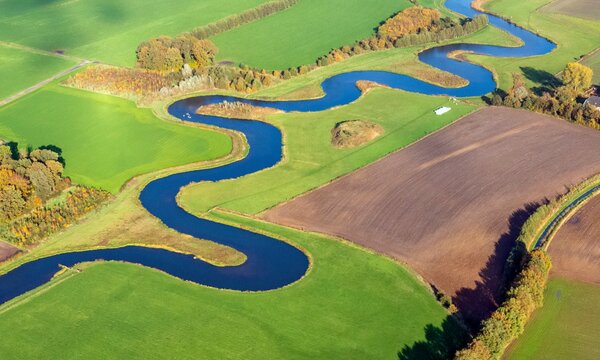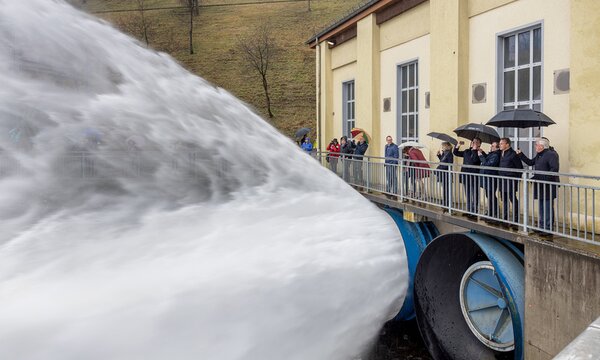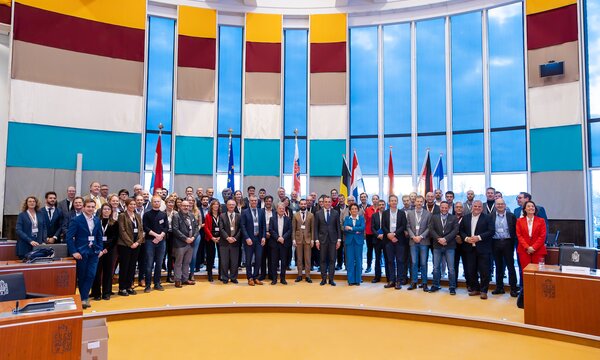We spoke to Anicia Touraine Andersson, a PhD researcher from University of Twente, who is conducting her research ‘Unlocking Collaboration in Hydrological Risk Governance: The Role of Knowledge Management Practices in Facilitating Social Learning’ within the scope of our program. We discussed the potential impact of her work on enhancing regional climate strategies through improved cross-border collaboration, and how it could help to define shared goals for climate adaptation despite the uncertainties that lie ahead.
Welcome Anicia, thank you for speaking to us about your work. Can you briefly describe the main topic of your PhD research?
My research focuses on mechanisms that enhance transboundary collaboration in flood and drought management. As climate change introduces new uncertainties, it’s crucial to implement resilient practices at the river basin scale. Effective collaboration often involves more than just sharing knowledge; it requires developing shared problem definitions that facilitate integrated solutions. My work will explore how knowledge management practices - specifically concerning technical knowledge like models, maps, and forecasts - can foster collaboration and promote social learning within transboundary water governance.
What motivated you to pursue a PhD, and why in this field of research?
My pursuit of a PhD stemmed from a strong belief in evidence-based policy, which I first explored during my master’s degree in public policy, specialising in risk and vulnerability. I was deeply inspired by professors engaged in policy-relevant research related to risk management and climate adaptation. Witnessing how their work informed real-world decisions motivated me to contribute in a similar way.
Is there a specific geographical component in your research focus?
Yes, my research specifically targets transboundary regions, which are areas where rivers cross political borders. I plan to begin with case studies to delve into the dynamics of transboundary collaboration, initially focusing on basins like the Vecht and Rur before examining the larger Benelux-plus region.
What specific objectives are you aiming to achieve with your current research?
The core objective of my research is to uncover how knowledge management practices can be intentionally designed and applied to enhance social learning processes, thereby improving collaboration. This includes an in-depth understanding of knowledge creation, sharing, use, and evaluation throughout the disaster risk management cycle across different governance levels.
Which opportunities and challenges do you envision conducting your research in a transboundary context?
I foresee fantastic opportunities to connect with diverse stakeholders and learn from their expertise, offering deep insights into the challenges inherent in working across borders. The knowledge gained from this research will inform my future endeavours, particularly in considering the political and geographic dimensions of environmental resource management.
How does your research fit within the partnerships between regional governments and academic institutions?
The synergy between academic institutions and regional governments is a central theme in my research. I aim to explore how we can enhance the impact of academic findings on regional flood and drought management by streamlining the processes of knowledge production and dissemination to support effective collaboration.
In which ways do you see your research having an impact on policymaking?
I believe that successful outcomes from this research can enhance collaboration among stakeholders, leading to improved flood and drought management practices and climate adaptation measures at the river basin scale within transboundary regions. Ultimately, I hope to support a transition towards more integrated approaches to disaster response across borders.
Given the wide variety of stakeholders involved in JCAR ATRACE, what interactions do you look forward to?
In my research, especially with the case studies, I look forward to building solid relationships with stakeholders across different levels of governance in the Dutch, German and Belgian regions. I am eager to learn from their experiences and collaborate to address the challenges we face together in transboundary water governance.
What long-term impacts do you envision your research having on regional climate strategies?
In a best-case scenario, I envision that the findings from my research will foster improved collaboration across borders. Establishing strong transboundary alignment for disaster risk management and climate adaptation will enable us to develop integrated solutions at the river basin level, thereby enhancing resilience to climate extremes.
Which scientific or technological breakthroughs do you hope to encounter during your PhD?
I hope to gain insights into specific knowledge management processes that are crucial for effective collaboration. Achieving this would lead to practical and applicable recommendations that could positively influence not only the Benelux region but also extend beyond it.
What are some challenges you anticipate facing as climate conditions continue to change? And how do you see your research adapting to these evolving challenges?
I anticipate that the effects of climate change will introduce greater uncertainty regarding hydrological extremes. Issues such as water resource shortages may lead to the politicisation of these problems. Political tensions can severely hinder collaborative efforts, resulting in siloed approaches to hydrological management. Therefore, I aim for my research to support transboundary solutions, facilitating joint problem definitions and shared goals for climate adaptation across political borders, helping to maintain collaborative efforts in such challenging times.



